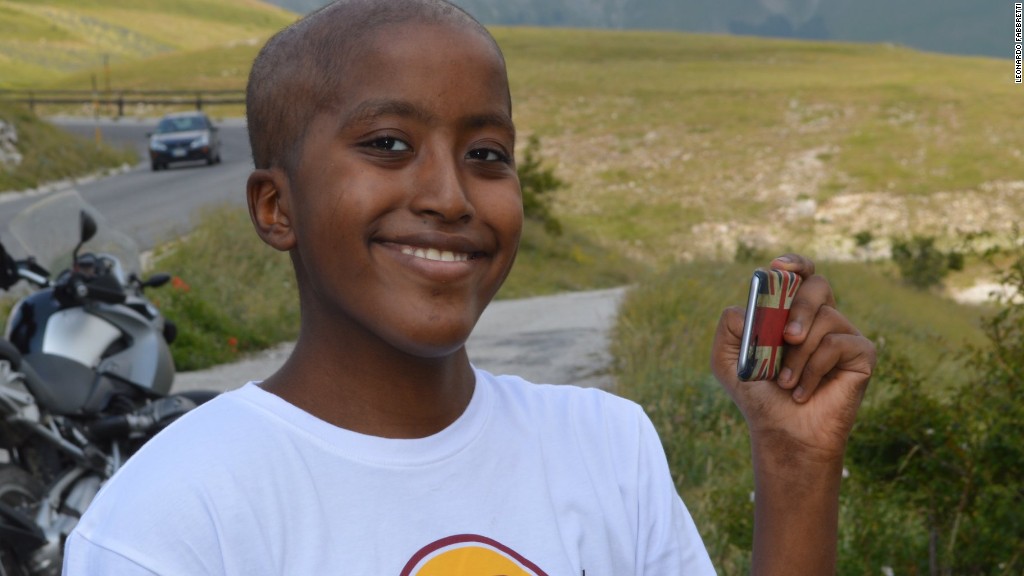
A judge recently took the controversial step of letting the FBI force a woman to unlock an iPhone with her fingerprints. But it didn't work.
CNNMoney has learned that the FBI was unable to open an iPhone in Los Angeles.
It's an important detail when debating how new technology -- and new police methods -- affect Americans' Fifth Amendment right to avoid self-incrimination.
And it shows that while the FBI unlocked the San Bernardino terrorist's iPhone 5C, law enforcement still has trouble getting into most iPhones.
The present case sparked nationwide attention when it was highlighted by the Los Angeles Times last month. It concerned a recent criminal case in California involving Paytsar Bkhchadzhyan, the girlfriend of an accused Armenian gang member.
On Feb. 25, she showed up at a state courthouse to be sentenced to jail for identity theft, according to court records. That very same day, on the other side of town, a federal judge signed off on a warrant forcing her to push her finger on an iPhone. The iPhone had been confiscated at the Glendale home of her boyfriend, Sevak Mesrobian.
The LA Times article posed a pivotal question: If a person can't be forced to unlock their phones by revealing their passcode, why is a judge forcing a person to unlock a phone with her fingerprints?
As it turns out, the method didn't work anyway.
"They forced her to use all 10 fingers to unlock the phone. But it didn't unlock the phone," said George G. Mgdesyan, the attorney who represented the couple.
When that didn't work, FBI agents tried an alternative route, he said.
"They asked for a password. She said, 'It's not my phone,'" Mgdesyan explained.
The U.S. Attorney's Office in Los Angeles, which handled the case, provided a copy of the search warrant. But officials declined to comment.
Bkhchadzhyan's case marks the second time -- known to news reporters -- that law enforcement was able to get this type of warrant.
The other case involved David Charles Baust, a Virginia man accused of strangling a woman in his bedroom (and later found not guilty).
The victim told police Baust recorded everything on his iPhone 5S, so police wanted to search through his device. They obtained a judge's permission for a fingerprint unlock.
But they weren't able to unlock the phone either.
The police had the phone in their custody for about six months, according to Baust's defense lawyer, James Broccoletti. And as it turns out, when a person hasn't unlocked their iPhone using the Touch ID feature for 48 hours, the device will demand their passcode as a security measure, according to Apple.
In his ruling about the iPhone search, Virginia Circuit Court Judge Steven Frucci made a novel distinction. The judge said it's okay for police to force suspects to use physical characteristics, like a fingerprint, to unlock a phone. But they can't force someone to "disclose the contents of his own mind," like a password.
Frucci's ruling relies on a Supreme Court ruling that police can indeed obtain your fingerprint, photo, height -- or even your blood. On the other hand, giving up your password is like being forced to speak against yourself, which violates the Fifth Amendment.
It's an odd split in logic, because fingerprints and passcodes now do the same thing: unlock information.
"Sometimes the law gets too cute. We shouldn't leave common sense out of the equation," said David Oscar Markus, a high-profile defense attorney in Miami. "The process is the same thing. You're getting access to someone's most private information by forcing someone to give you the key."
Broccoletti, the lawyer in the Virginia case, said, "It's going to be our job to educate the judges. A print isn't just a print."
Susan Brenner, a University of Dayton law professor who focuses on technology, explained why.
"By putting my finger on the reader, I effectively 'testify' that this is my laptop -- or I have control over the laptop that belongs to someone else. And by unlocking the data, I also effectively 'testify' that this is my data," she said.

